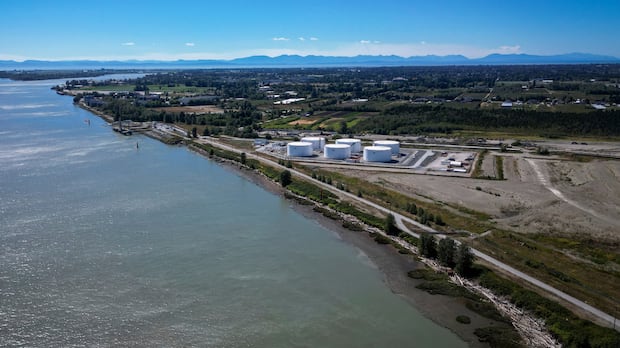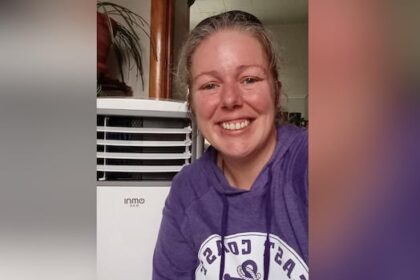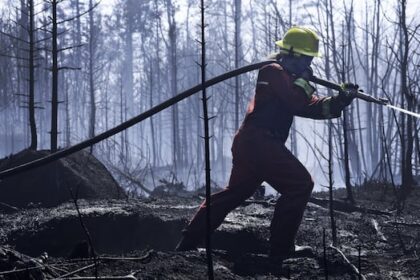British ColumbiaThe legal system can work in years, the news cycle works in days — and politicians are caught in the middle, with claims and counterclaims filling the void until further decisions are made. While political back and forth continues, lawyers caution that resolving the ruling could take yearsJustin McElroy · CBC News · Posted: Oct 21, 2025 10:00 AM EDT | Last Updated: 4 hours agoThe City of Richmond is appealing a B.C. Supreme Court decision that gives the Cowichan Tribes Aboriginal title over about 7½ square kilometres of land in the city. (CBC News)It was a letter given by the mayor of Richmond, B.C., to somewhere between 125 and 150 property owners — but quickly seen by many more around the world.“The court has declared aboriginal title to your property which may compromise the status and validity of your ownership,” wrote Malcolm Brodie in his viral letter, which invited people who could be impacted by the Cowichan Tribes court decision to an information session on Tuesday.A B.C. Supreme Court judge ruled in August that the Quw’utsun (Cowichan) Nation have the right to about 7½ square kilometres of land in the City of Richmond, 11 years after legal proceedings began. The nature of the ruling has attracted plenty of attention, which Brodie said was a reason for holding the information session. “People are still in the dark and others are quite alarmed about the situation,” he said, arguing that the establishment of Aboriginal title in areas with private landownership was untenable. “If you held [simple fee ownership], you didn’t have to worry about an Aboriginal claim against your property. Now that line is gone and any property in the province is now fair game.”It was a worry also expressed by Anna Woitowitsch, a Richmond farm owner who received Brodie’s letter.“I was upset. I thought, finally it’s happening, what my father worried about for 90 years, and now what do we do about it?” she said.Brodie’s characterization of the ruling differs from what many legal experts believe.But at the same time, the uncertainty about what comes next — and when those decisions will happen — is adding to tensions over the case.WATCH | Why the Cowichan Tribes case is so complex — and contentious:City of Richmond to hold information session with landowners on Cowichan Tribes caseSome homeowners in Richmond, B.C, are feeling nervous after the city sent them letters saying their property rights might be in jeopardy. It follows a court ruling giving the Cowichan Tribes Aboriginal title over some Richmond land. Justin McElroy breaks down the complexity of the case, and why this story is likely to take a long time in the courts.Ruling doesn’t displace ownersIn her ruling, Justice Barbara Young emphasized several times that the granting of Aboriginal title does not “displace private owners on the land.” “The Cowichan do not seek recovery of the private fee simple lands but rather a mechanism for negotiating the reconciliation of their Aboriginal title,” she wrote.It’s a point underscored by David Rosenberg, lead counsel for the Cowichan Nation in their case.“This case was never about challenging the fee simple with respect to privately owned lands. The case was brought against the Crown for return of public lands that were wrongfully taken from the Cowichan,” Rosenberg said at the Union of B.C. Municipalities (UBCM) convention last month.“We have a decision that now recognizes that Aboriginal title and fee simple interest can and do coexist.”At the same time, Young said it’s up to governments to determine what that means going forward. “These interests may be resolved through negotiation, challenged in subsequent litigation, purchased, or remain on the Cowichan Title Lands. That is not a matter for this Court to address. B.C. and the Cowichan should be afforded space to reconcile these competing interests,” she wrote. However, not everyone believes that is possible. “To my simple mind, it’s very hard to see how they can both exist at the same time,” said Robin Junger, B.C.’s former chief treaty negotiator, who spoke at the same UBCM session. At the same time, he expressed confidence in the process of further court appeals and negotiations. “I think there are some legitimate issues in the judgment that I disagree with,” he said.“I don’t think people should panic. I’ve said publicly that there is a process for all this, but I also don’t think it’s just going to be smooth sailing.”WATCH | Malcolm Brodie’s interview with CBC News about his letter:Richmond mayor concerned Cowichan Tribes decision could impact property titlesRichmond Mayor Malcolm Brodie said he’s worried the Cowichan Tribes court ruling recognizing their Aboriginal title to some land in the city could lower property value or impact ownership in the area. He told CBC’s Stephen Quinn he will speak with impacted property owners at an upcoming public information session. How long will it take?Because of the complexity of the case, and because all seven parties involved in the Cowichan Tribes case say they will appeal the decision, it will likely take many years to be resolved, much less move forward on potential negotiations over what shared title means. “We’ve got to do this not all over again, but in another fashion in the Court of Appeal and very likely in Ottawa before the Supreme Court of Canada. So this is not going away anytime soon. And we don’t know ultimately what the court is going to do with this,” said Reece Harding, a lawyer with Anderson Young, who argued that the public deserves faster answers.“To the third parties whose titles have been affected, there needs to be a resolution for those people. They do not deserve to have uncertainty with respect to their title moving forward. So get on with it.” On Monday, B.C. Premier David Eby agreed that “clarity and resolution is urgently needed,” and disagreed with Opposition Leader John Rustad’s proposal of suspending negotiations with First Nations on various issues in the interim.At the same time, he could not give a timeline for when these questions would be resolved.“We are arguing to defend those private property rights of those homeowners and for certainty to ensure that businesses can make the decisions to invest that they need to make,” he said. “We hope the courts will reach those decisions very quickly.”ABOUT THE AUTHORJustin is the Municipal Affairs Reporter for CBC Vancouver, covering local political stories throughout British Columbia.
Why uncertainty over end result of Cowichan Tribes case invites plenty of speculation











